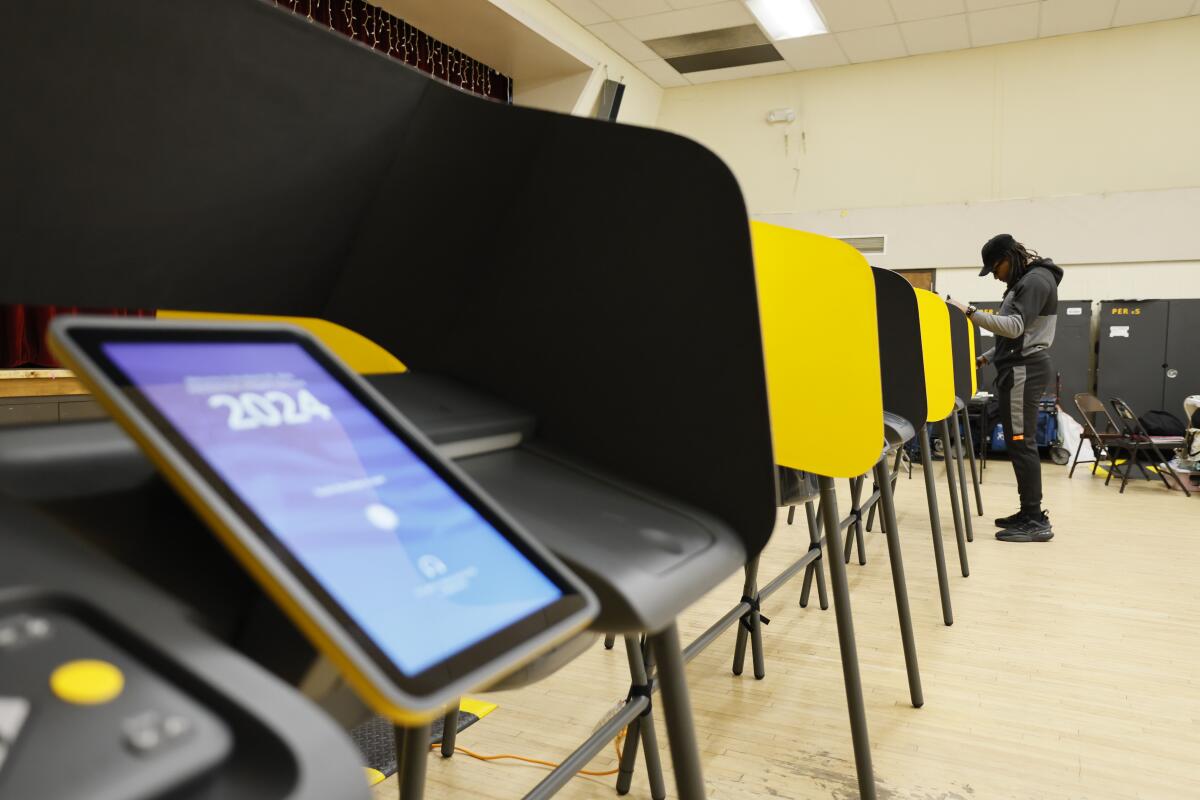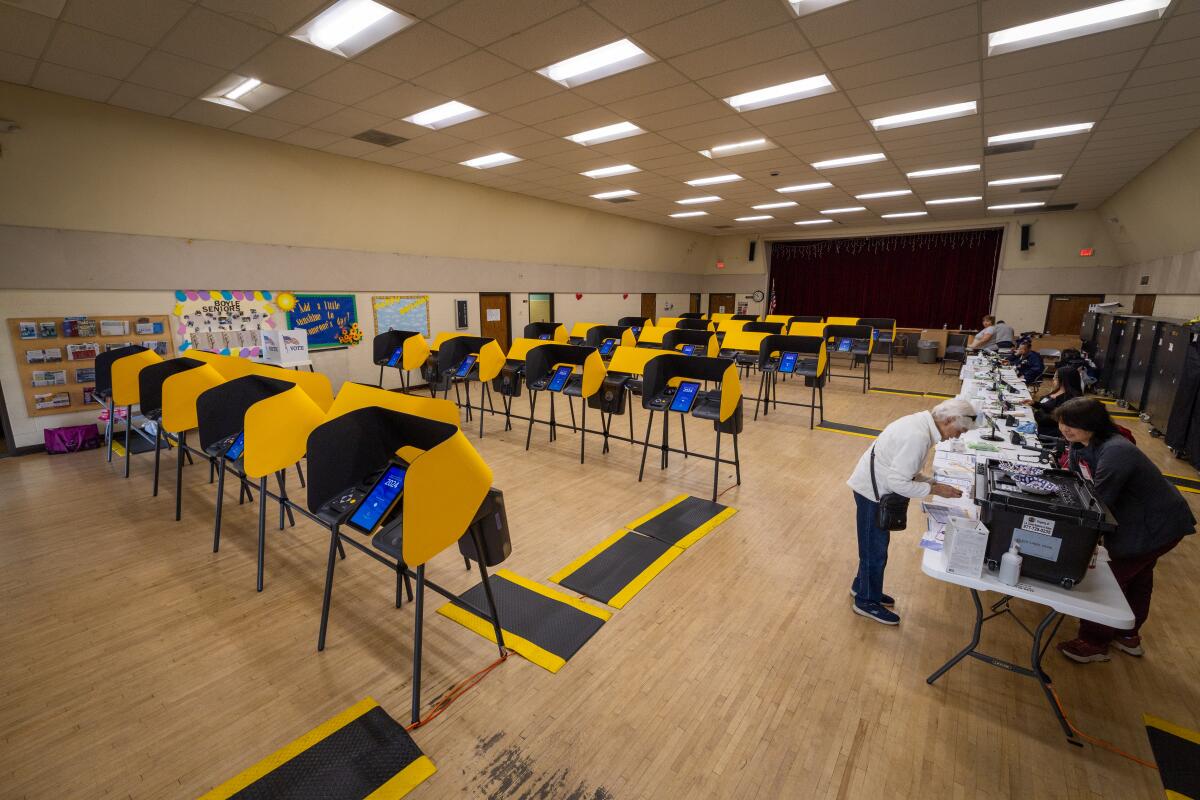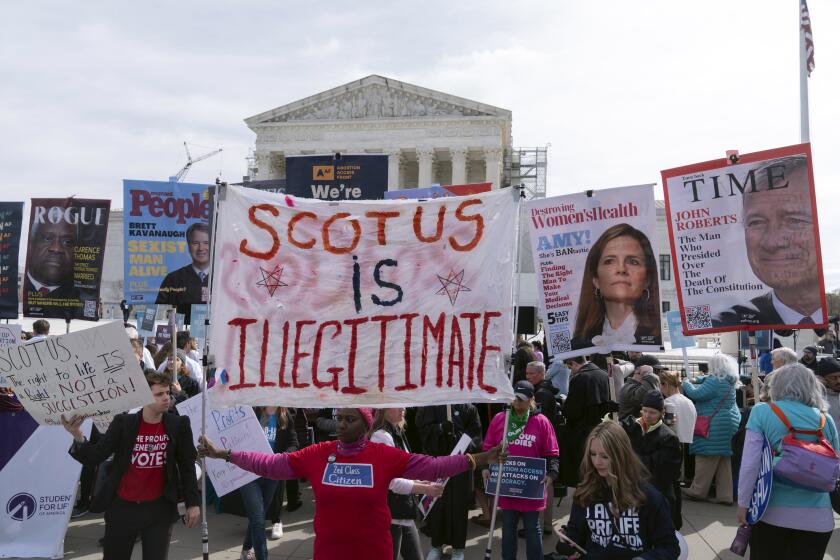Biden and Trump’s main challenge? The apathetic voters who could decide the election

- Share via
Although Haley Fox, 30, frequently chats politics with friends and family, she said, the moment the phrase “election 2024” comes up she feels her body fill with dread.
“There hasn’t been anything that has represented me for a really long time,” said Fox, a San Diego-based photographer. “So, like, 2024, just seeing what we have to choose from — it just feels so bleak.”
For Fox and many other Americans, election-year ennui is setting in. President Biden and former President Trump became their parties’ presumptive nominees weeks ago, capping one of the shortest primary seasons in U.S. history and beginning the long runway to the general election.
“It’s essentially two incumbents running against each other, is how it feels,” said Jared Sichel, a GOP strategist and co-founder of the Costa Mesa-based Republican marketing firm Winning Tuesday. “It’s kind of just Groundhog Day for a lot of people.”
Voters who don’t want either option — “double haters,” as they’re dubbed — make up about 15% of the electorate, according to polling last month from USA Today and Suffolk University. Other polls show their share to be closer to one-fifth of the electorate. In a neck-and-neck race between Trump and Biden, the bloc will be crucial in November.
But whether they will turn out to vote is the million-dollar question. Most Californians are not looking forward to voting for president this year, according to a February report from the Public Policy Institute of California.
Although 84% of Californians agreed that the 2024 election is “very important,” fewer than 4 in 10 said they are “extremely” or “very” enthusiastic about voting for president. Democrats are less enthused than Republicans, and independents are more apathetic than either party, the study found.
The Supreme Court appears unlikely to create further abortion restrictions in its upcoming ruling about the safety of mifepristone. But another threat to abortion access — from a Trump White House — is far more likely to succeed.
The palpable apathy among voters has played out in low turnout in primaries across the country. Elections in presidential years typically get a boost from all of the national media attention. But the Washington Post found that just 10% of voters nationwide had cast their ballots in primaries through mid-March.
California saw just 34% of registered voters cast ballots on Super Tuesday, according to the secretary of state — the second-lowest presidential year primary turnout in the state’s history. (Just 31% of the state’s registered voters cast primary ballots in 2012, then-President Obama’s reelection year.)
Despite having more options for voting than ever, Los Angeles County was among the five California counties with the lowest voter turnouts in the March 5 primary, with 29% of registered voters casting ballots, the secretary of state reported. The low turnout came despite California moving its primary day to Super Tuesday, to align with 14 other states and American Samoa and encourage more voters to participate.
The Biden campaign, which was mostly quiet through Super Tuesday, launched its big push after the president’s State of the Union address two days later. His fiery speech, which pundits widely labeled as his way to fight against the narrative that he’s too old at 81 for another four years as president, kicked off a multiweek tour through key swing states.
Biden, Vice President Kamala Harris, First Lady Jill Biden and Second Gentleman Doug Emhoff made stops in Nevada, Arizona and even California. Biden and his surrogates headlined multiple fundraisers, racking up more cash to add to the campaign’s burgeoning coffer of $155 million, according to the latest finance reports. His financing far outpaces the $42 million that Trump’s campaign had at the end of February.
“The stakes of this election couldn’t be higher, and our campaign is investing our historic resources in reaching voters where they are, earning every vote, and making sure the American people know how much is on the line this November,” senior Biden campaign spokesperson Sarafina Chitika said in a statement.
“As Donald Trump promises to be a dictator on day one, rip away women’s freedom to choose, and rig the economy for himself and his wealthy friends at the expense of the middle class,” she continued, “it’s clear his toxic agenda and lack of resources mean he’s got nothing to win over the voters who will decide this election.”
Trump, meanwhile, has been busy with court appearances for his multimillion-dollar civil fraud judgment and preparations for the first of his four criminal trials, scheduled for April 15. He has also continued to be active on Truth Social, his social media platform, blasting Biden and independent candidate Robert F. Kennedy Jr.
The Trump campaign did not respond to requests for comment.
“The more that Trump is able to stay out of the news, or at least [if] what he’s saying is focused on Biden, he will be able to probably turn out some of the more independent voters,” Sichel said. “I think the Biden campaign’s turnout is much more going to be based on alarm about Trump than excitement about Biden.”
But while the dueling campaigns fight for relevance among apathetic voters, their messages are not always cutting through the noise.
“It’s the boy who cried wolf,” Fox said. “OK, here we go again — democracy is at stake.”
“That was the theme of the campaign in 2020 ... battling for the soul of the nation,” said Mark Gonzalez, chair of the Los Angeles County Democratic Party. “Every time we say this, it’s the most important election of our lifetime. But this one, in particular, is showcasing in [Trump’s] presidency all of the damage he had done.”
The county parties share a rare moment of unity in their messaging to encourage turnout and combat apathy: Vote local.

“Our message as a county party is to say there is no election more important than that for city council, board of supervisors, state Assembly and state Senate,” said Roxanne Hoge, a volunteer for the Republican Party of Los Angeles County.
Hoge’s challenge is making disgruntled Republicans living in majority-Democratic Los Angeles County understand that the best way to channel their frustration is through voting.
“You miss 100% of the shots you don’t take. So don’t complain. You know things aren’t great,” Hoge said. “You got a ballot; you’ll get one in October — turn it in.”
Breanne Deam, 34, didn’t vote in 2020 or 2016. And though the Yucaipa resident said she complains about politics with friends and family members regularly, she said she’s likely not to vote again this year.
“I know voting makes a difference. I think it does,” said Deam, an independent. “But those are just not my candidates.”
Biden hasn’t delivered on his campaign promises, Deam said, and she worries about his age. Trump brings too much baggage to please enough voters, she added, making this election feel particularly tense. She finds supporters of both candidates angry, and thinks America needs a candidate who can unite voters.
“It feels like a divorce. It seems like one is the mom and one’s the dad and we’re the kid,” Deam said. “At the end of the day, they don’t care about anyone but themselves.”
Fox, the San Diego photographer, voted unenthusiastically for Biden in 2020, deeming him a better choice than Trump. But she has watched in dismay his handling of the Israel-Palestinian crisis.
Get the L.A. Times Politics newsletter
Deeply reported insights into legislation, politics and policy from Sacramento, Washington and beyond. In your inbox three times per week.
You may occasionally receive promotional content from the Los Angeles Times.
“For somebody whose grandparents emigrated here from Palestine, I cannot vote for Biden,” she said.
But Trump is also a no-go for the registered Democrat — and she couldn’t remember the name of the third-party candidate who had once piqued her interest. (She later recalled that it was Claudia De la Cruz of the Party for Socialism and Liberation.)
Fox was once an enthusiastic follower of politics, tuning in to presidential election debates and keeping up with current events. Even though she wants to stay informed, Fox said, she has taken a step back from keeping up with the daily rigmarole of politics.
“Now it’s become something that feels like this really depressing chore,” Fox said. “Like, ‘Well, I guess I’m gonna figure out what’s going on for the election that I don’t want to vote in.’”
The most she can do now, she said, is consume a few videos or op-eds about the Middle East conflict before tuning out and playing some easygoing TikTok videos to lighten the mood.
But the road from primaries to November’s general election is long, and much can change over the next seven months.
“I don’t know how much the candidates or the campaigns are going to be able to drive turnout as much as events that are outside of their control,” said Sichel, the Republican strategist. “Because, you know, who doesn’t already know where they stand on Trump and Biden?”
When Lynne, a 70-year-old voter in Long Beach who declined to give her last name, cast her ballot on Super Tuesday, she encouraged her fellow voters to stay focused.
“We can’t think about the president so much; we’ll go crazy,” Lynne said. “Just focus on your own little part of the world. Make your own little part of the world better.”
More to Read
Get the L.A. Times Politics newsletter
Deeply reported insights into legislation, politics and policy from Sacramento, Washington and beyond. In your inbox three times per week.
You may occasionally receive promotional content from the Los Angeles Times.












